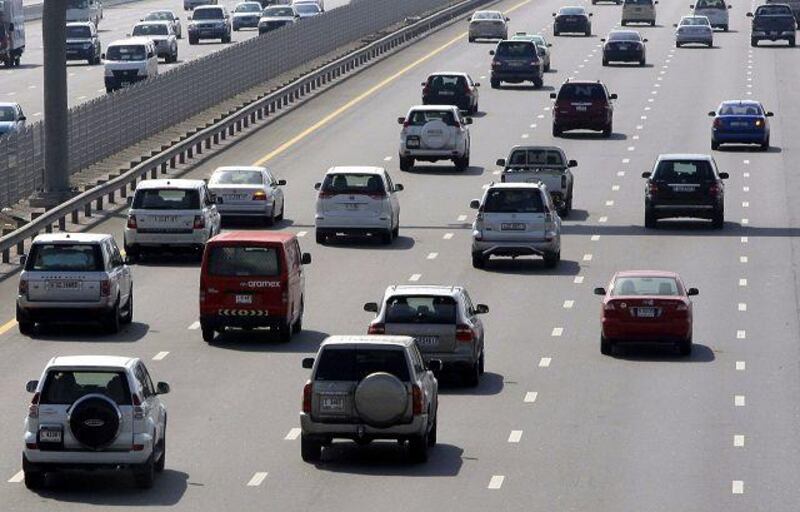DUBAI // Motorists are ready to get behind a campaign against tailgating. They wonder, however, if the police can back up their plans to make it succeed. The Dubai traffic police launched an awareness campaign, Safe Distance, last week to highlight the dangers of driving too close to the car ahead.
"If they are implementing the rule strictly and giving drivers black points, then I definitely will follow it," said Aarti Nanda, 22, an Indian student who lives in Abu Dhabi and drives to Dubai to attend college. "But I don't find it very practical as I don't see how everyone will maintain that rule, especially on the highway." Tailgating is such a big component of the country's vehicular carnage 1,071 road deaths last year that police decided to target it.
The campaign sets out existing minimum safe distances between cars that drivers should maintain, depending on speeds. At 40kph, for example, the gap should be at least 35m, or seven car lengths, according to the guidelines. Lt Col Ali Ghanim, the director of the Bur Dubai police station and the campaign leader, said the rule outlining safe following distances "has been in place for a long time but the majority of motorists are unaware of it".
Lt Col Ghanim was unable to say how many people have so far been stopped for tailgating. As part of the campaign, police officers will hand out booklets at shopping malls and to motorists whom they pull over for breaking the rule. Electronic display boards on the city's motorways will warn drivers of the dangers of not keeping a safe distance. The existing penalty for motorists stopped for tailgating is unchanged Dh400 (US$110) and four black points on their driving licence.
Lt Col Ghanim said the traffic police were trained in spotting drivers who did not keep a safe distance. Ali Mohammad, 39, a motorist from Oman, doubted the campaign would achieve much. "There is so much illegal driving here and in the region, it would be impossible to impose such a rule," he said. "The [recommended] distance is too much, and how would they enforce the law?" A traffic expert, Simon Labbett, the regional director of the Transport Research Laboratory, said educating drivers to the hazards of tailgating was the first step in combating it.
"It is one of the most dangerous activities on the roads in Dubai," he said. "When you are driving within a car's length, it is beyond human capacity of reacting [in time to avoid a collision]. "That is the reason why there are accidents and the police are absolutely right in targeting this type of behaviour." Drivers who tailgate were risking the lives or others as well as their own, Mr Labbett said. "Statistically, if you are constantly following behind drivers at those kind of speeds and those distances there will be accidents."
Chris Whiteside, 45, a financial officer from the UK, said although tailgating happened in other countries it was more of a problem in the UAE. "It's the same in Cairo but there are more cars and not going as fast," he said. "And also in Mumbai, but there are a lot more cars there, too, and they are going so slow it would not matter. Here there is too much speed and crazy driving standards. It would be impossible to implement as the law enforcement is poor."
Abu Bakr, 34, a taxi driver from Pakistan, suggested the campaign would make little difference to daily driving on Dubai's roads. "If it was properly enforced, it would work but it is so difficult to keep distance from the cars in front," he said. "Speed cameras make some cars slow down while others don't. Sometimes, the car is too slow in front when I am in the fast lane; they are going less than 100kph. So you have no other choice but to drive behind them. If you go up close to them, they realise you are there and then they get out of the way."
Rami Haddad, 34, a native of Lebanon who works in Dubai Internet City, was in favour of the rule but said the Roads and Transport Authority should consider giving more black points for tailgating. "Fines are easier to pay but you can't remove black points," he said. "If they give you four black points on your first mistake then look how close you are to getting the maximum number of black points in a year. It will take time for people to follow it. They will have to get used to it."
eharnan@thenational.ae wissa@thenational.ae






